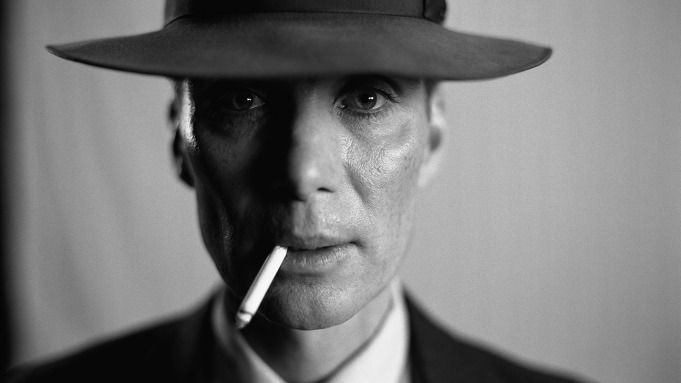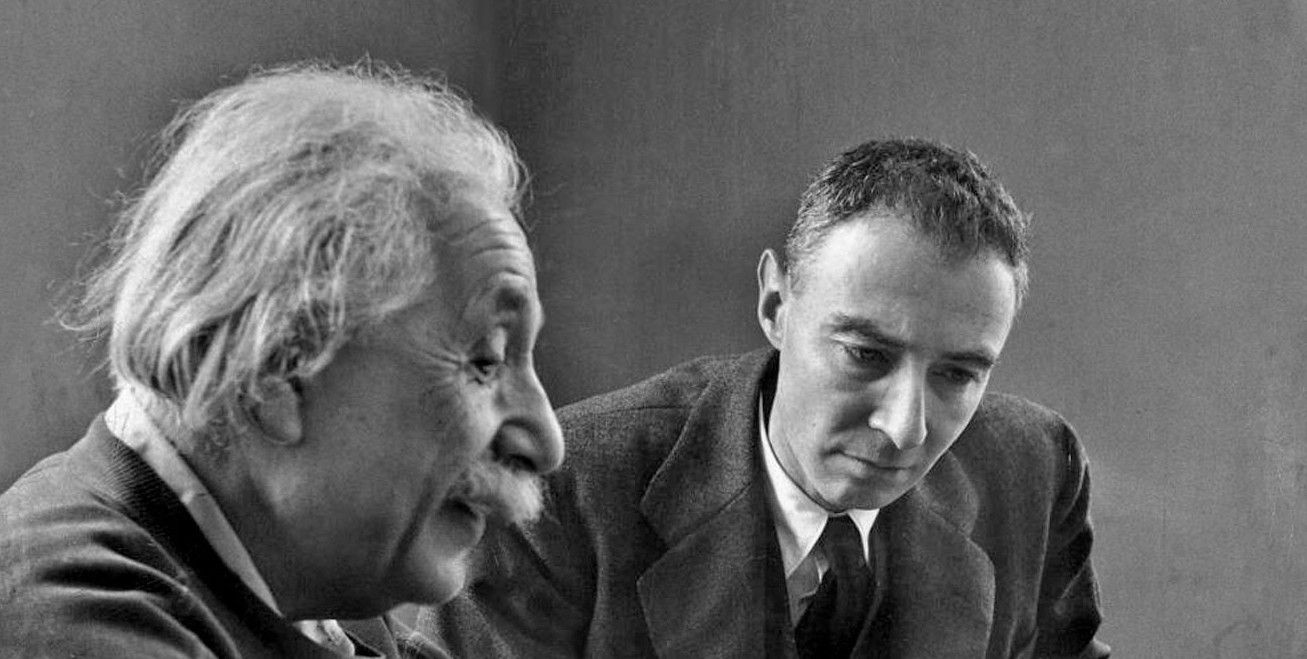Christopher Nolan will finally make his biopic. The famous director had a stunted attempt to mount one two decades ago when he penned a screenplay about aviator Howard Hughes, which he later described as the best screenplay he's ever written. The project died when Martin Scorsese's The Aviator went into production first. Now, Nolan is working on a film about the father of the atomic bomb, J. Robert Oppenheimer.
However, Oppenheimer may very well break conventional biopic expectations. Nolan took his script to Universal after a rift with longtime collaborators Warner Bros. regarding the studio's new policies of distribution via streaming, and Universal is describing the film as an epic thriller about an enigmatic man. Cast in the lead role, Cillian Murphy has stated that "the story is there, everybody knows what happened, but Chris is telling it in a different way, as with Chris you would expect. That’s all I can say."
The picture has amassed a formidable cast and crew. The script is by Nolan, adapted from the Pultizer-winning book American Prometheus. Ludwig Goransson will write the music, Hoyte Van Hoytema will work as the film's cinematographer, Emily Blunt will play Oppenheimer's wife, Matt Damon will be the director of the Manhattan Project, which was responsible for the bomb's development, and Robert Downey Jr. will be the chairman of a commission that questioned Oppenheimer's loyalty to the United States. In further casting news, Florence Pugh was announced as a Communist Party member who had an affair with Oppenheimer that alarmed U.S. officials, Benny Safdie was cast as Edward Teller who worked with Oppenheimer and was later the father of the hydrogen bomb, Rami Malek joined in an unknown scientist role, and Kenneth Branagh and Dane DeHaan were recently added to the star-studded list.
While we wait for the July 21, 2023 release, we can explore who J. Robert Oppenheimer was and go over some of the things we know about what drove this complex historical figure. We'll analyze his famous quote, "Now I am become Death, the destroyer of worlds", to understand whether or not he regretted his work.
Who Was J. Robert Oppenheimer?
J. Robert Oppenheimer was a theoretical physicist, educated first at NYC's Ethical Culture School, an interesting background for a man who would become, as the jacket of American Prometheus describes him, "the embodiment of modern man confronting the consequences of scientific progress." Oppenheimer states in the book: "My life as a child did not prepare me for the fact that the world is full of cruel and bitter things."
He established during the 1930s the U.S.'s leading school of theoretical physics, in California. He was greatly involved there in social justice causes and had some ties with communists, which raised eyebrows from American authorities, and put him under question and surveillance by the FBI.
What changed from that point to make him the leading man in the government's Manhattan Project? On the government's side, he was simply too much of a brilliant mind not to invite on board. In the 1940s, the Manhattan Project director wrote, "it is desired that clearance be issued to Julius Robert Oppenheimer without delay irrespective of the information which you have concerning Mr Oppenheimer. He is absolutely essential to the project." On his own side, Oppenheimer "liked things that were difficult" according to the book, didn't have the best of social lives, and once said: "I need physics more than friends."
Did Oppenheimer Regret the Atomic Bomb?
To understand Oppenheimer's ethical view on his work, it's essential to contextualize his famous quote, "Now I am become Death, the destroyer of worlds," which comes from Hindu texts. While he wasn't strictly a Hindu, he read the Bhagavad Gita, the most important of Hindu scriptures. Oppenheimer was very attracted to Hindu philosophy in making sense of his actions, according to scholar Rev Dr Stephen Thompson.
At first, during his work on the bomb, Oppenheimer viewed his contribution as a form of duty, like the duty of a solider who isn't in a position to question his generals' broader plans. He had in mind the story of Arujna, a Hindu prince called to war. As Wired magazine and Alex Wellerstein, a historian of nuclear weapons, explain: Arujna doesn't lack courage or skill, but he doesn't want to fight because his teachers, cousins and friends had joined his enemy's side, and killing them would be against honor. The god Krishna then speaks to Arujna about why he must go to war, why not fulfilling a duty would be against honor. Krishna's argument rests on the fact that it's not a soldier's job to determine the fates of who lives or dies; it's up to Krishna. A solider should be unattached to that and have faith in the greater design.
In the story, Arujna is still unsure, so Krishna reveals himself in a magnificent sight in his godly, multi-armed form. That's when he utters the famous words, which Oppenheimer used after the successful "Trinity test" of the atomic bomb in New Mexico: "Now I am become Death, the destroyer of worlds." Oppenheimer wasn't referring to himself when he saw in reality what the bomb can do, but to forces beyond him, greater than any of us. Depending on the translation, what Krishna told Arujna is "Death am I, and my present task Destruction," or "I am the world-destroying time." The point is that, regardless of what Arujna does, there's an ongoing war in which many will perish, and eventually we all perish whether by war or by time. These are not a soldier's responsibilities. We have to act within our roles, and not everyone's role is to answer the big questions. "Arjuna, suitably impressed and humbled, then agrees to join in the battle," Wellerstein writes.
Wellerstein also points out how Hiroshima and Nagasaki, the Japanese cities where the bomb was dropped, were on a list of cities to be firebombed by the U.S. anyway. Had the bomb never been made, that's what would have likely happened.
But unlike Arujna, Oppenheimer was never able to achieve peace with his role in the events. Two years after the Trinity test, he said "the physicists have known sin.” In Hindu philosophy, there's an idea that life is in some sense an illusion, and people's souls live on. It was easier for Arujna to live with his deeds in war because when taking enemy lives, it wasn't the end of the line for them. But Oppenheimer "hadn't got that confidence that the destruction, ultimately, was an illusion,” says Thompson in the Wired article.
When the question of bombing Hiroshima and Nagasaki was opened, Oppenheimer's panel was asked for their opinion on two alternatives to bring the war to an end: a U.S. military invasion of Japan costing many American lives, or a nuclear attack claiming many Japanese civilian lives. They opted for using the bombs. "Oppenheimer later regretted the decision, saying that the intentional slaughter of civilians had been unnecessary and wrong,” as per World of Physics.
After the war, as the U.S. were entering the next stage of nuclear development with the hydrogen bomb, Oppenheimer opposed the idea and did not believe in a nuclear arms race, advocating international weapon controls instead. In response, many notable U.S. figures worked to make him the subject of hearings for un-American activities, using his previous Communist ties against him.
He became a humanist, the book relates, "pondering man's survival in an age of weapons of mass destruction."



